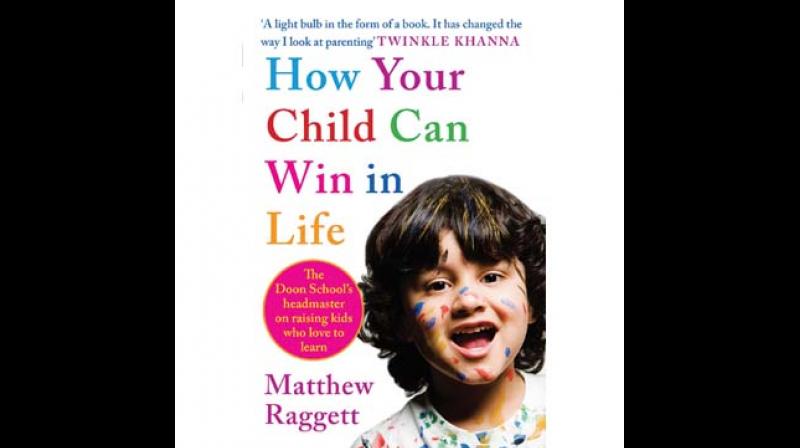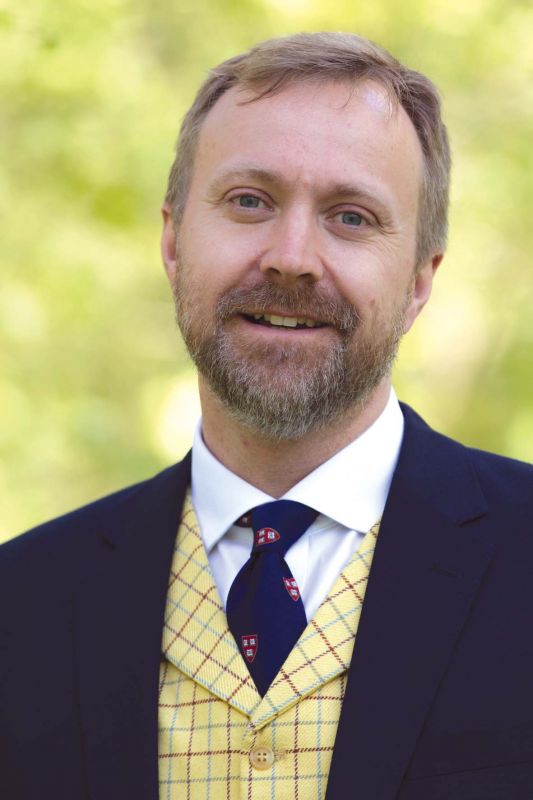For that winning edge
What’s lovely about the book is how it talks about how schools for the underprivileged are doing wonderful things.

For first time parents and people with toddlers of school going age who are obsessed with how to get their child into the best school, How Your Child Can Win in Life by Matthew Ragget, headmaster of the famed Doon School, is a great summer read.
Don’t be heartbroken if your child doesn’t make it to the school of your choice, says Matthew as he points out in his book, “Remember that you will shape your child better than any school can....Whether you like it or not, you are the teacher who will have the greatest impact on them.”
And if you can’t afford a fancy school with its sky-high fees, relax. The book opens with a great example of how you don’t need big bucks for a great education. The Purkal Youth Development Society is a school of 550 students, entirely from the most disadvantaged sections of society in Uttarakhand. Apparently its graduates get into United World Colleges and universities in the States on scholarships.
So how does the faculty at this school achieve something like that? Through its two libraries, believed to be on par with American and British schools. Reading thus, is the key to success in life, says the author.
How Your Child... stresses on the importance of mental nourishment which is achieved through books and reading. The book highlights the significance of holding a book and reading aloud to your child as soon as he/she can sit in your lap. Reading newspapers together with your kids as they grow older is another fantastic activity, suggests Matthew. “I think that parents should be reading to their children all the way through primary and secondary school....You cannot be sure of what they are silently reading to themselves and they still have a great deal to learn from you,” he says.
The school you choose should have a culture of learning for teachers. Schools producing toppers, according to Matthew, are not necessarily the best. “You should be looking for evidence of warmth, empathy, vulnerability, and a recognition that they don’t have all the answers along with an aspirational desire to nurture every student,” he explains.
Some of the questions you should be asking teachers are: Why do you choose to work here? How do your students know you care about them? What does success look like? What else does the school do other than exam preparation?
Also, the author urges parents to go beyond just ICSE, CBSE or IB curriculum. “In the broadest sense, a curriculum is the complete set of experiences, subjects, lessons and activities that make up a school’s programme,” says Matthew.
And if your school offers IB, make sure to find out if the teachers are actually equipped to teach it. Schools offering Indian and International curriculums often find it hard to get the right teachers because both syllabi require a different way of teaching, so find out before paying the fees.
What’s lovely about the book is how it talks about how schools for the underprivileged are doing wonderful things. The Fabindia School in Bali, Rajasthan, established in 1992 to meet the needs of the kids of Fabindia artisans is not a posh school, but the teachers are there to learn and teach. Everything about the school is built around learning, points out Matthew.

The book highlights the need for teachers to learn about their kids, and underlines that expulsion should only be the last resort, not the first for naughty behaviour.
Children will be thrilled to know that the headmaster at one of India’s best schools thinks holiday homework and too much homework are wrong. You read about how in Canada, a 153-year-old school gives no homework until class 5 other than guided reading and family discussions in preparation for themes to be explored in school over the coming weeks.
Many other important parenting tips are offered. While a lot of these tips are already known to us, it’s nice to find out why it’s important to do so. For example, giving kids unlimited access to Wifi is asking for disaster. But why should we be so strict about it? Check out the disturbing statistics - “Over the last two years we have learned from boys who arrive in school in the 7th class, that 42 per cent of them have watched porn or are regularly watching pornography at home. By the 8th class we know that the number has risen to 70 per cent and that they are forming friendship groups based on their taste for pornography.” The message here is don’t feel guilty about keeping tabs on what the kids are up to.
On the whole, How Your Child... is recommended for parents educating themselves on the world of schools and a must for ones trying to get their kids into Doon because you will know what the headmaster is looking for.
‘Parents produce toppers’
What made you decide to write this book?
Was nudged into it by Ram Guha, an old boy of the school, he was visiting for founders day in 2017 and we were taking about some of the things we worry about at school and why. It was a lovely conversation, he is a great thinker. He wrote to Chikki Sarkar (the publisher) and said we should do something together.
What should parents look for in a school?
A lot of us have been conditioned in our consumerist society to look at certain things that we think we want. For schools the things are shaped by what we are shown like infrastructure, lovely reception areas, fancy trips and toppers. But those things are not really what schools ought to be focusing on. Parents not schools produce toppers. That comes from the disposition a child gains over the years.
The things that matter the most are the quality and care that the adults working with the child are providing and what they think.
Why did you choose to live in India?
My wife and I have worked in seven countries. We have had a child in Austria, one in Canada and one in Singapore. We have been deliberate about what we show them of the world, and how people interact and treat each other. We thought very carefully where we can go in the world to teach them something that is going to change their perspective, India is the place.
Today older schools which traditionally were considered the best in India are losing out to their newer completion. Why?
With the rise of middle class in India, disposable income and the market for education being there you will have schools that will appeal to different people depending on what they are offering. Sometimes when I talk to parents who are looking at the type of school they are looking at some will say they are looking at the brand. Putting your children’s education up with a BMW or Louis Vuitton is not the right way at looking at education. It’s like looking at your children like items on a shopping list.
Your definition of a curriculum?
A curriculum is everything that you plan to do at school, not an assessment tool you use at the end of the 10th or 12th. When a school says it’s an ICSE or CBSC school I wonder what they are talking about? It’s just an assessment tool, what is my child going to learn if they go to that school, what human being will they become, what opportunities will they be given to ask questions, learn to evaluate and be creative. A school should be asking if they are meeting the needs of their students, what does learning look like?
Your approach to naughty kids?
When people talk about naughty ... it’s cheeky, a sense of humour, fun, invitational. Part of banter, very creative. My daughter used to get told of being naughty but that meant she had her own questions wanted to move around and work with other people . It’s about being collaborative and we must prepare our children to be great collaborators , to be team mates, you can’t work in isolation. But when it comes to dealing with risky behaviour, and instances where one’s actions can hurt themselves or others, fundamentally schools should believe in second chances, but expect that you won’t see that mistake or habit repeat. Parents have an enormous role to play in that.
Importance of a good primary education?
Schools often have to respond to and mitigate and help children who have developed habits or ways of working with others already. When you are taking kids at 11 or 12 in secondary school, they have pretty much established a value systems, moral compus, what is right and wrong... it’s hard to change that for a secondary school. Primary education is where the real education is. That’s where you are actually shaping the deep wiring system of a child’s brain and parents do that at home at a very foundational way and primary schools do all the socialising with all the other kids.

